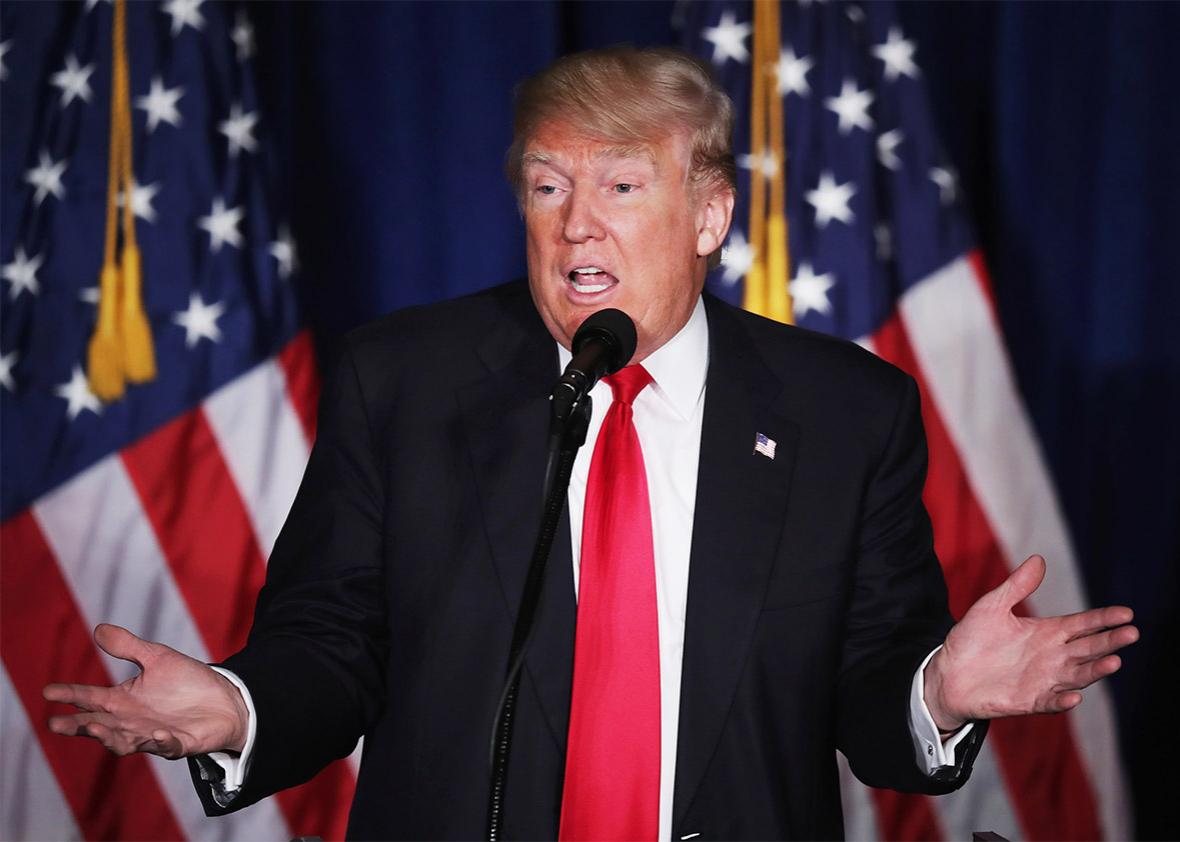I didn’t think it possible, but Donald Trump’s “major foreign policy address” on Wednesday—a written speech, which he read off a teleprompter—was even more incoherent than his impromptu ramblings of the past several months. In fact, it may stand as the most senseless, self-contradicting foreign policy speech by any major party’s presidential nominee in modern history.
For example, he said that, because of President Obama’s policies, our friends and allies feel they can no longer depend on us—then said that a Trump administration would quit NATO and abandon our allies in Asia entirely unless they started spending more on defense.
He said that his No. 1 national-security goal would be to defeat ISIS—then said that he would work with other nations to do so only if they “appreciate what we’ve done for them,” because for us to be good to them, “they also have to be good to us.” (There’s something childish, even narcissistic, about this demand, which he recited in the tone of a desperately firm parent.)
He said, as he has many times, that our trade deficit has severely weakened America and strengthened China—then said that we have enormous economic leverage over China and that we should use it to get China to rein in North Korea.
He said we should not help any country that isn’t our friend—then proposed easing tensions with Russia. (It’s possible to hold one view or the other, but not both.)
He said he would strengthen America’s economy in order to shrink the deficit—then said he would use the extra wealth to boost jobs, then said he would use it to increase the military budget, without the slightest recognition of possible trade-offs or the need to set priorities.
Then there are the statements, many of them reprised from debates and campaign speeches, that are simply untrue. He claimed that Iran has violated the nuclear agreement, when in fact it’s abided by the terms. He added that, because of the deal, Iran has become “a great, great power”—which must come as news to Iran’s leaders, who are frustrated that, despite the lifting of sanctions, they still can’t get much trade going with the West. He said Obama has “snubbed” Israel, when in fact many Israeli military and intelligence officers credit Obama with providing more security assistance than any recent president.
Trump added that Obama has let our nuclear arsenal atrophy, when in fact the Pentagon is spending $20 billion a year to maintain and modernize it. He said Obama’s proposed defense budget for next year (which, by the way, amounts to $608 billion) is 25 percent smaller than his budget for 2011—when, in fact, it’s larger. He said that, since 1991, the active-duty U.S. Army has shrunk from 2 million troops to 1.3 million, that the Air Force is one-third smaller, and that the Navy’s force of ships has declined from 500 to 272—which may sound alarming, until you consider (which Trump hasn’t) that the Cold War ended in 1991: It would be strange if the military hadn’t shrunk since then.
And there were the bombastic pronouncements with no basis whatsoever. “The world is more dangerous than it has ever been.” (Think about that claim for one minute, and you’ll see how absurd it is.) About ISIS, he said, “They’re going to be gone if I’m elected president, and they’ll be gone very, very quickly.” (What does this mean? Is he going to scowl at them? Nuke them?) “No one knows how to reduce debt, but I do.” (One way he reduced debt in the private sector was to buy debt-ridden companies, then abandon the creditors or offer them dimes on the dollar or nothing. International debt doesn’t work this way.) He also said, as he has before, that he opposed the Iraq war because it would destabilize the Middle East—when, in fact, he supported the invasion not long before it took place.
Finally, he lent credence to the suspicion that he’s never read a history book. In what a cynic might interpret as an act of speechwriter’s sabotage, he embraced the tag “America First,” going so far as to say it will be “the overriding theme” of his foreign policy. He doesn’t seem to realize that this was the slogan of Charles Lindbergh—in his 1940 campaign against President Franklin D. Roosevelt—to remain neutral and isolationist during World War II. Is Lindbergh Trump’s witting role model?
This was, I repeat, a prepared speech, not some rambling remarks by a candidate in over his head. I don’t know who wrote it, but it seems to confirm rumors that no prominent Republican national-security advisers are assisting Trump’s campaign. Clearly this is the speech of an unserious man who hasn’t read up on the issues or thought through his own instincts. The dangerous thing is not so much that he knows nothing about foreign policy; it’s that he doesn’t know just how much he doesn’t know.
